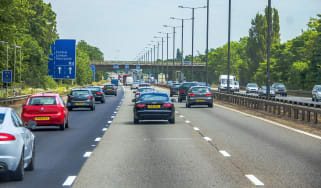Cat S and Cat N cars explained: guide to buying an insurance write-off
Cat S, N, C and D cars have been written off by an insurer – should you buy one?
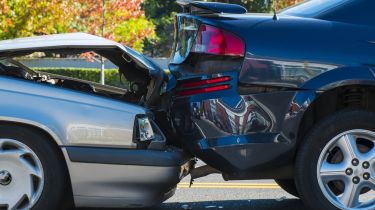
It’s common to come across the terms ‘Cat S’, ‘Cat N’, ‘Cat C’ or ‘Cat D’ when shopping for a used car. These labels, along with the umbrella term ‘V car’, are used to identify cars that have been damaged and then written off by an insurer. But what does it mean for a car to be “written off”?
All cars carrying a ‘Cat’ label have sustained some sort of damage, significant enough for the insurer to write off the car. Insurers will write off a car if the repair costs are deemed to be too expensive in relation to the car’s value, or if the damage makes it impossible to repair the car to road-worthy standards. Depending on the severity of the damage, the insurer will categorise the car under one of the ‘Cat’ terms above.
Cat cars are often priced lower than equivalent non-Cat cars on the used market, making them seem like great value. However, buyers must be aware that all Cat cars have previously been damaged, even if nothing appears to be amiss cosmetically. Different Cat labels indicate different types of damage, too, something that’s important to know you're planning to buy one.
What is an insurance write off?
An insurance write off is a car that has been damaged and deemed too expensive to repair by the insurer.
If a car is damaged, insurers can choose whether to pay to have it repaired, or to not repair it. While an insurer will pay for most minor damage, including scrapes, dings and dents, it is more likely to write off the car if the cost of repair exceeds 50% of its market value. This sometimes includes major structural damage or damage to the engine. When this happens, the owner receives the market value of the car but doesn’t get the car back.

After the insurer decides to not repair the vehicle – i.e, write it off – the damage is categorised under the Cat A, B, S or N labels to signify the level of damage and whether the car can be purchased on the open market. If a repairer purchases the damaged car and repairs it to roadworthy condition, it will still carry the Cat tag until it is permanently removed from the road. The tag will be found on the car’s V5C logbook, and some used car sale websites, such as Autotrader, will automatically mark the ad with a write-off category if you list the car for sale.
Those wanting to prove their vehicle has been repaired to such a high standard that the car is not discernible from one without a record of damage can do so by successfully passing an advanced inspection. This removes the vehicle from the ‘condition alert register’ to the ‘condition inspected’ register. An HPI report can show three different categories under a vehicle accident history:
- Clear – The vehicle has no history of ever being written off
- Condition alert register (VCAR) – The vehicle is written off with an unknown quality of repair
- Condition inspected – The vehicle is written off with high quality repair
It is important to note that a condition inspected categorisation does not entirely remove the past accident status of the vehicle – it will still carry the Cat tag. Also, this will only update the HPI report, and is not guaranteed to update other reports such as Experian.
What are the insurance write-off categories?
When insurers decide to write-off a car, they place the car in one of four categories depending on the severity of the damage. The four categories are:
- Category A – The car is for scrap only. The car cannot be repaired and parts cannot be salvaged.
- Category B – B stands for ‘break’. The car cannot be repaired, but it can be broken for spare parts if the insurer deems it economical.
- Category S – The car has sustained structural damage. If professionally repaired, it can be returned to the road.
- Category N – The car has sustained damage, but it is non-structural. It can be repaired and returned to the road.
What is a Cat A or Cat B car?
Category A and Category B (Cat A and Cat B) cars are deemed to have received such severe damage that they cannot be returned to the road.
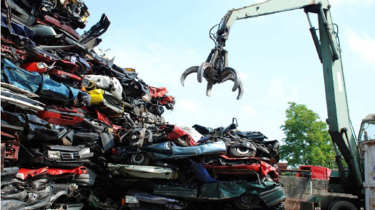
Cat A is the most severe. The car will be so damaged that it cannot be used for parts, so instead, it must be scrapped entirely. Cat B cars also cannot be repaired but can be broken for spare parts.
What is a Cat S or Cat N car?
Category S and Category N (Cat S and Cat N) are used to label written-off cars that can be returned to the road once they have been repaired to an acceptable standard.
Category S is assigned to cars that have suffered structural damage. This is significant enough to mean a repair shouldn’t be attempted on a DIY basis.
Category N refers to cars that are not structurally damaged, but require the replacement of safety-critical components related to the steering, braking or suspension.
Even cars with minor damage can be declared a Cat S or N – something that’s particularly common if it’s a much older car of lower value. This is because the cost of processing the insurance claim and repairing the car is more likely to exceed the car’s value.
Some vehicles, including classic cars or niche models of special interest, can be allowed to be repaired ‘irrespective of extent of damage’, as long as it’s safe for them to return to the road.
Should I buy a Cat S or Cat N car?
We advise against buying a Cat S or Cat N car for the majority of car buyers. It can sometimes be difficult to discern the standard that the car has been repaired to, and you run the risk of buying a car with hidden faults.
That being said, many insurance write-offs will have been professionally repaired and will be indistinguishable from a non-category car. If you’re comfortable with the added risk of purchasing a Cat S or Cat N car, it’s vital to make sure that any accident damage has been fully repaired to the required standards. A third-party inspection is essential – we’ll provide more detail on these below.
Car repairers, dealers or those who are particularly mechanically-minded can purchase a Cat S or Cat N car directly from a salvage auction, and carry out the repairs themselves. If you’re thinking of buying a damaged car to repair it, you’ll need to have a good idea of the costs involved – there might be additional unseen damage which could lead to higher costs.
If you're buying for personal use, resale profit probably isn't a factor. If a salvage vehicle holds particular interest – perhaps it's a model or specification that you've long been searching for – a repairable Cat N or Cat S car could make sense even if the cost of repair means it ends up saving you only a little money compared to an undamaged car.
Is it safe to buy a Cat N or Cat S car?
When buying a Cat car, there is a risk of ending up with something that has been poorly repaired, potentially making it less safe. However, a well-repaired example can prove to be good value and it will more than likely be as safe as a non-Cat car.
Thorough research and inspection of a potential purchase is absolutely essential if you want to buy a Cat car, so while it could come with its rewards, it’s advised to always know exactly how much work will be required.
Can I sell a Cat N car or Cat S car?
It’s legal to sell a Cat N or Cat S car as long as its Cat status is declared. If you’re a dealer, this declaration must be clear, even if the car has been repaired to its pre-accident condition.
If you’re a private seller the rules sit in a slightly grey area – if you’re asked about the Cat status you must declare it, so it’s best just to make it clear from the outset in any case. Be aware that a Cat car will be worth less than a non-Cat car, so this should be factored into your asking price. Many buyers simply aren’t comfortable buying a car with a history of damage.
What about Cat C and Cat D?
Category C and Category D (Cat C and Cat D) are the old categories from the previous categorisation system that have subsequently been replaced by Cat S and Cat N, although the new system works in a slightly different way.
Introduced from 1 October 2017, the new Cat S and Cat N system assesses the severity of the damage and whether the repair is actually feasible. The old system only took into account the estimated cost of repair. The definitions for the old categories are:
- Cat C – The car can be repaired and returned to the road, but the cost of the repair exceeds the car’s pre-accident value.
- Cat D – The car can be repaired and returned to the road, and the cost of the repair does not exceed the car’s pre-accident value.
The amended system is intended to help inform used-car buyers if a car has previously suffered significant structural damage that they must be made aware of. This is becoming increasingly important as the complexity of modern cars means they may be written off because of electronic issues rather than structural damage that is considered beyond economical repair.
What is a write-off engineer report?
A write-off engineer report is a condition inspection carried out by a professional automotive engineer. The engineer will inspect a repaired car for any signs of damage, and to check that the repairs have been carried out correctly.
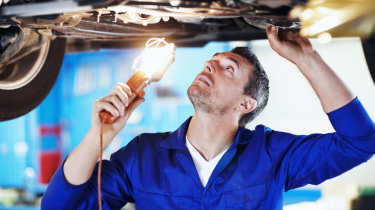
We recommend having a third party inspect any vehicle that you are looking to buy no matter its former condition. For a car that has been previously written off, this is even more important. Repairs carried out may have been done by an insurer-recognised garage or may have been ‘condition inspected’, but it is still better to have a respected organisation take a look. After all, a vehicle may have been damaged five years ago and repaired impeccably, only to have been poorly treated or further damaged since.
Will I have to pay more to insure a Cat S or Cat N car?
You should also be aware that some insurers may insist on an engineer's report or inspection prior to offering cover for a Cat S or Cat N vehicle. This is not a rule throughout the industry and insurers understand the marketplace for repairs well. It is even possible that the company you insure your car with may have previously written it off.
If you find a seller referring to their car as ‘condition inspected’ with the certificate and HPI report to back this claim then it is unlikely an insurance company will require further inspection. Though, it’s always best practice to contact them and be sure.
What does the law say?
It is important to understand your rights when purchasing any vehicle and avoid any grey areas that may appear. If you are buying from a motor trader they must inform you of any and all information that is pertinent to the vehicle. This includes its previous status as a write-off. However, we should stress that records used across the motor trade industry are not always 100% accurate. If you find that you’ve purchased a vehicle and it is not as it was initially described, you should contact the seller immediately and flag your concerns.
The law when buying from a motor trader
We advise you to always do your own checks as the Consumer Rights Act 2015 is clear to protect you. While some honest traders may immediately try and rectify any problems, others may be less willing. To avoid the potential headache and cost of pursuing a dodgy dealer, a third-party check and doing your own condition report using a company like HPI could be integral to making sure you get your money’s worth.
The law when buying privately
Private sellers have no law stopping them from selling a previously recorded, or presently written-off vehicle without informing a buyer. You could buy a Cat S or Cat N car without realising it, and sellers may claim they were unaware, essentially acting without complete knowledge.
However, knowingly selling a car that is not roadworthy and not informing a buyer could lead to further action against a seller, especially if it were to cause death or injury. A buyer may also choose to take civil action against a seller resulting in a court case.
Advantages of buying a Cat N or Cat S car
- Potentially big savings – If you choose to buy a Cat N or Cat S car that has been repaired to a high standard by a reputable firm, you may have saved yourself a lot of money rather than opting to buy a perfect example.
Disadvantages of buying a Cat N or Cat S car
- Lower resale value – A Cat N or S car will always have that label, which buyers can see if they carry out an HPI check or look into a vehicle’s past, and it will always have a lower resale value than a car that’s never been in a serious accident.
- Insurance could cost more than usual – If a car has been damaged and repaired, insurance companies may see it as being a higher risk, resulting in a bigger bill. Always get an insurance quote before doing the deal.
- Warranty may no longer be valid – any warranty on a car that’s been written off is likely to be void due to the damage it’s sustained, so if it goes wrong, you’ll be responsible for covering the costs.
- Risk – there’s a risk that the car may not have been repaired to a high standard, and the car’s condition and functionality could be compromised in ways that aren’t immediately apparent. This is why it is essential to carry out a third-party investigation prior to purchase.
Frequently Asked Questions
Looking to make big savings on the used car market? Read our guide on the best way to finance a used car and how to check if a car has outstanding finance.
Recommended
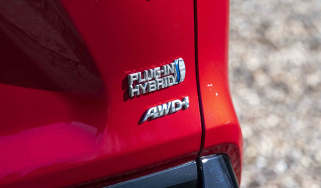
Petrol and diesel car ban relaxed with hybrids permitted beyond 2030
Most Popular
Tips & advice

Car dashboard warning lights: what does each symbol mean?

Electric car charging stations: public networks, charger types, apps and maps

